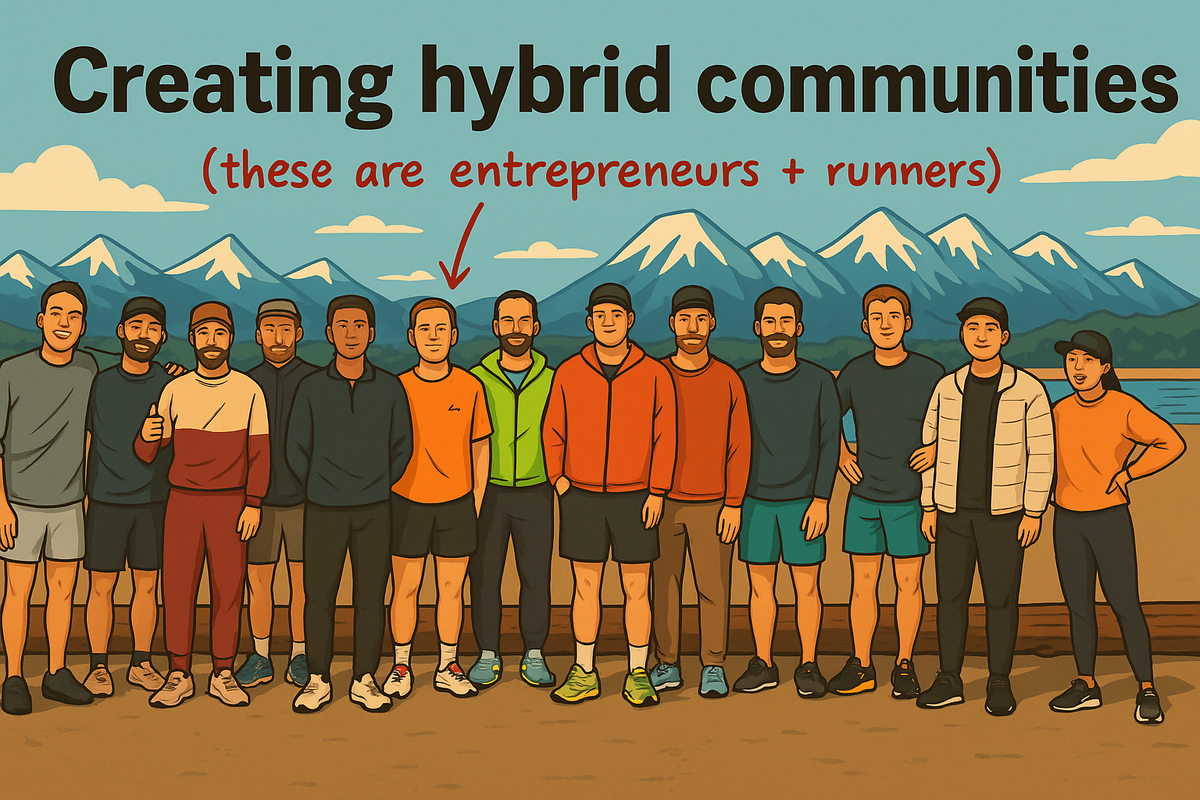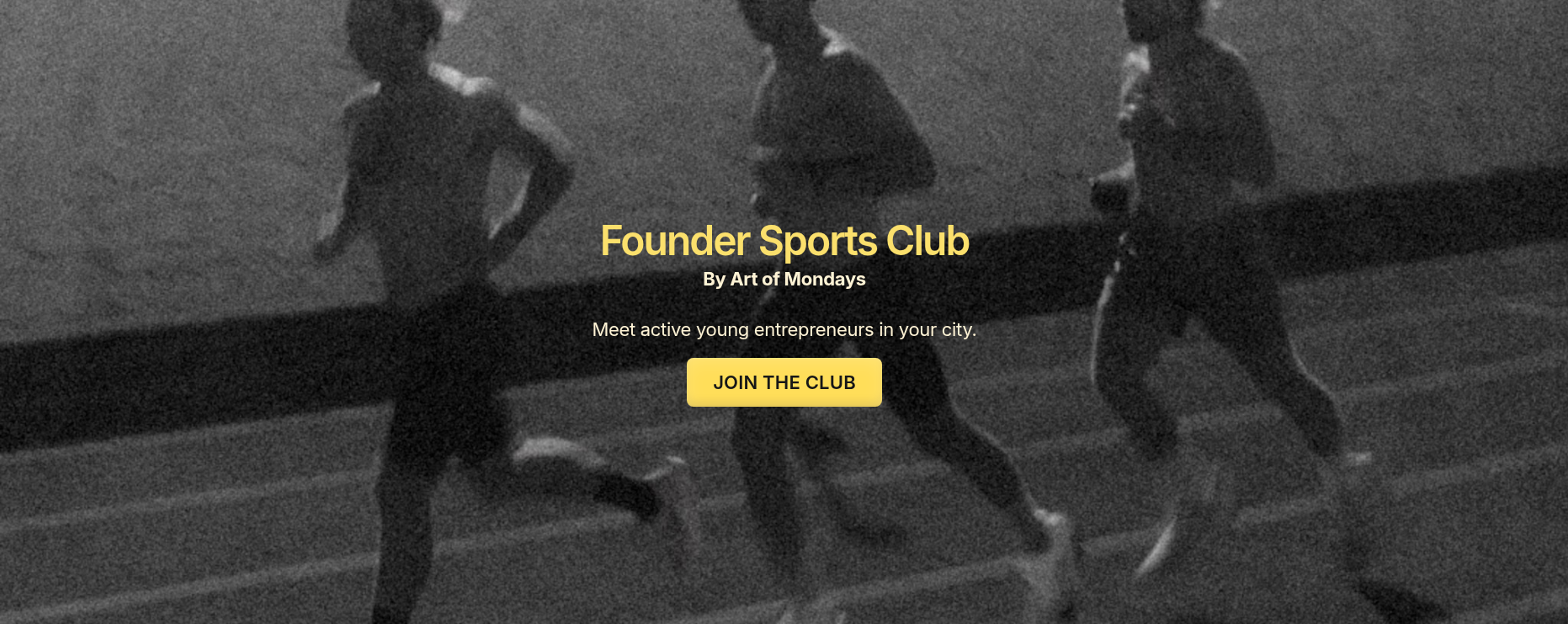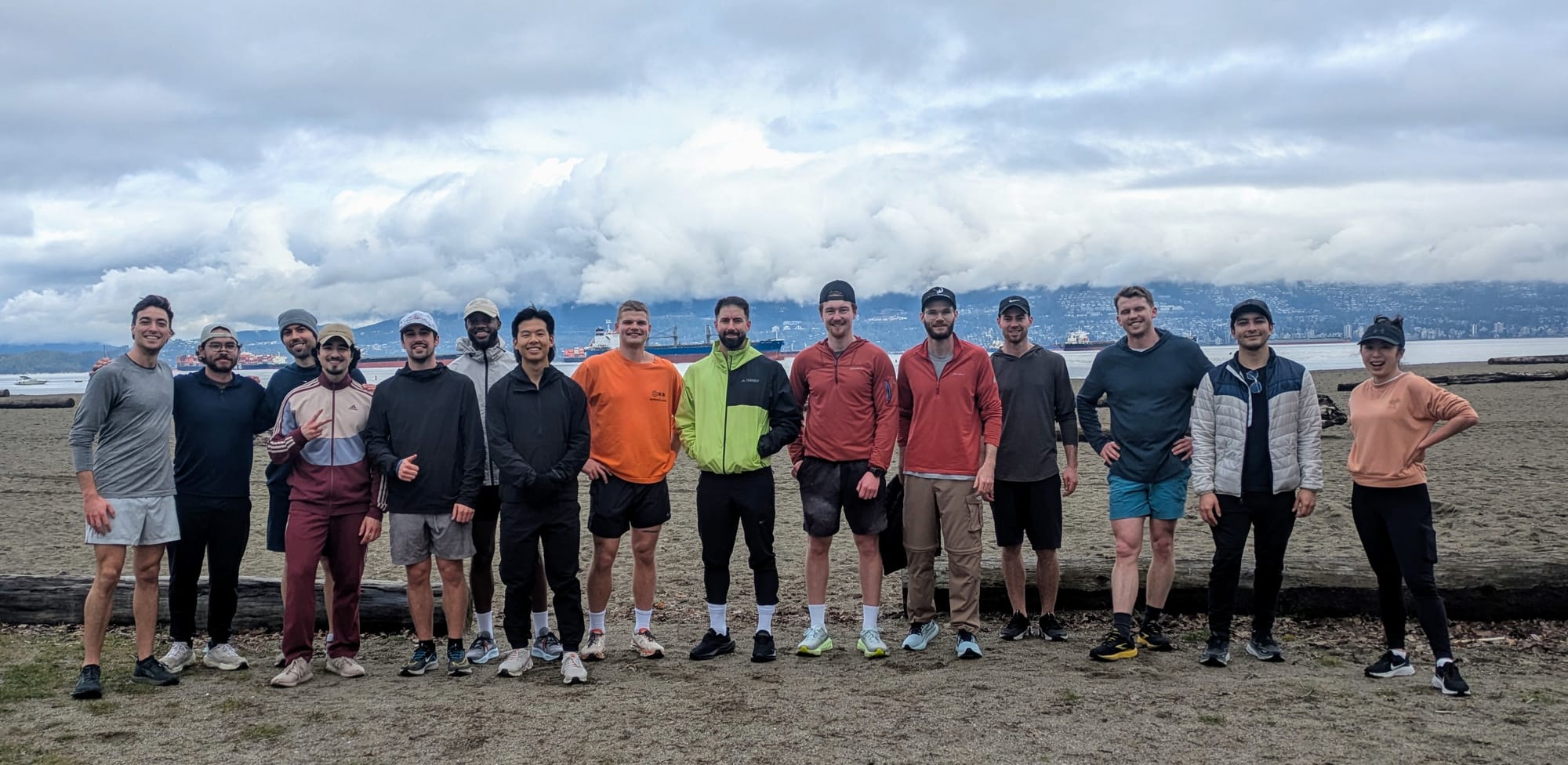Creating niche, hybrid communities
My adventures in learning how to create niche communities - ones that combine two or more interests to find more compatible friends in your city.

I've noticed a gap in the communities I've been discovering during my move to Vancouver and travels around the world.
I'm a big fan of things like run clubs (enough that I created an entire website dedicated to finding run clubs), and while these clubs and groups cater to a specific interest like running - I find it still feels like essentially a group of strangers when I show up to a run club of 200 people. It's overwhelming at times, and the small talk of 'how often do you run' can get old quickly.
As someone has entirely too many hobbies, activities, and passions in life, I can't help but feel there's room for something more specialized – communities that bring people together over multiple shared interests.
A prime example of this is the Founder Sports Club, an initiative by my friends at the Art of Mondays community. This group connects people based on two main criteria:
- You're an entrepreneur, founder, or someone running an online business.
- You're into fitness and staying active.

Once you join, you're paired monthly with three other founders in your city. Together, you can plan activities like tennis matches, hikes, or even sauna sessions. It's essentially business networking disguised as a sports club—a hybrid that works incredibly well.
This dual-focus approach makes the experience more engaging and meaningful for everyone involved. It's not just another networking event (which can feel dull) or a generic fitness group; it's both—and people love it.
This realization has inspired me to dedicate this year to finding and creating communities that unite people based on more than just one common interest. It's an approach similar to how I tackle business—niching down as much as possible to achieve a higher success rate across all my projects.
What Does a Hybrid Community Look Like?
My vision is straightforward: combine multiple hobbies and interests to forge deeper connections. Instead of focusing on just one attribute, why not add another layer (or two)?
The goal is to niche down until you're surrounded by exactly the people you want to connect with.
If we think of a normal run club that maybe has 100 people coming out consistently – now add on the requirement that it is now a vegan, software developer run club. The number of members will disappear quickly. Statistically you'd probably have something 4-8 people left over in that group of 100.
That can be a good thing or a bad thing.
The good
If your priorities in life align with these extra niche interests, I am of the belief that meeting these 4-8 others is a surefire way to quickly meet friends and connections that you are aligned with. I think this is particularly true when one side of the equation is religion, philosophy, etc.
For myself, it's always a joy to meet someone who eats plant based wherever I live - and that is an instant heuristic filter that generally means I'm going to like that person as I know they value the things that I do.
"Oh, I love that veg restaurant down the street! Want to grab lunch after our trail run this morning?"
The bad
The more niche, and the less amount of people, the less opportunities for "wildcards" and people that may surprise you with completely different mindsets, priorities, and values.
I think it is vastly important to meet random people in your life - especially those who have complete different careers, philosophies, and opinions to yours.
Niching / filtering too much can dim down the 'random' parameter in your life, and that's not always the best route to take.
Creating Hybrid Communities
By layering shared interests and values, we can build stronger connections and create communities that are both engaging and meaningful—at least that's my hypothesis.
I've been reading a wonderful book called "Belong" by Radha Agrawal. It's an actionable guide that left me inspired to get more involved in finding (or more likely, creating my own) communities, especially as I'm still settling into my recent move across the country to Vancouver.
One of the core points Radha emphasizes is the importance of deeply considering and writing down your core values and abilities, then expanding from there to find your community. While this is a substantial exercise (I can't simply sit down and list all my values in one session), it has been incredibly useful in helping me grasp that I connect best with people who share multiple interests, values, or hobbies with me.
My First Experiment: Founders Run Club
Inspired by the Founder Sports Club concept—and with help from their team—I've launched Founders Run Club in Vancouver. This community brings together local founders/entrepreneurs who also share a passion for running/fitness.
We meet twice a month at Kits Beach, and the feedback has been incredible. Members consistently mention how refreshing it is to find a niche community like this—one that truly resonates with their values and interests in a manner that doesn't feel stuffy or corporate.

We had about 20 people join us last Saturday, and as summer approaches, I expect that number to grow. If this sounds like something you'd enjoy, feel free to reach out!
What Else?
The entrepreneur + fitness combination isn't particularly original—plenty of similar groups exist worldwide with great success. So what other dual-interest or hybrid communities could we create?
Some ideas that come to mind:
- Runners/hikers + trail/park volunteering: We often run on trails around our cities but rarely spend time maintaining them or giving back to these green spaces. For example, a run club that volunteers at Stanley Park in Vancouver to help remove targeted invasive species from areas, etc.
- Entrepreneurs + environmentalists: Hackathons and meetups focused on creating technology with an emphasis on sustainability and environmental efforts.
- Niche book clubs: Some book clubs are already a great balance of this concept. Niche interest-specific book clubs (e.g., those focusing on backcountry camping or foraging books) are ideal hybrid communities. I'd love to see more of these specialized book clubs emerge.
An easy way to come up with ideas for this it to head to Meetup.com or Lu.ma for your city and it is quite easy to imagine combining any of these two or three groups together.
For example, look at Type Brigade, which is a typography meetup in Vancouver (I didn't even know events like that existed). It has 65 attendees going to the event on Thursday. That's great, but it is also a relatively large group if you don't know anyone.
If we were to combine the Typography group with the Meatless Meetup (a vegan foodie group in the city), that number dwindles down quite quickly. How many vegan typography nerds are there?
Like imagine having how niche a meetup of Vegan + Hiker + Typography Geeks would be? Sure, that might be a bit narrow -
What other hybrid communities exist? I'm excited to explore more possibilities and create spaces where people can connect on multiple levels, fostering deeper, more meaningful relationships.
Comments ()